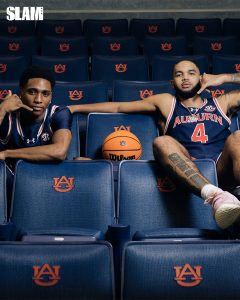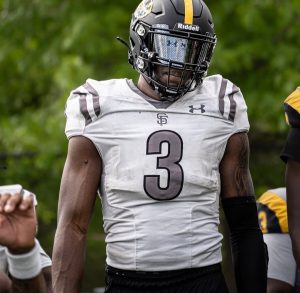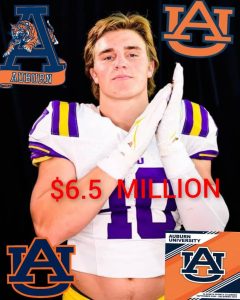
LSU Tigers: Nico Iamaleava’s Public Renegotiation Has Left College Football at a Crossroads
In a college football landscape already grappling with unprecedented change, Nico Iamaleava’s recent public stance on renegotiating his NIL deal has sent shockwaves through the sport. A former five-star recruit and one of the most highly touted quarterbacks in recent memory, Iamaleava’s declaration isn’t just a personal statement—it’s a seismic shift that challenges the foundations of how college football operates in the NIL era. While Iamaleava isn’t a member of the LSU Tigers, his actions are already having ripple effects in Baton Rouge and beyond. The situation has ignited intense debate about fairness, contracts, loyalty, and the future of amateurism in a world where college athletes have real market value.
To understand the significance of this moment, it’s important to consider the context. NIL has completely transformed the college football ecosystem since its formal adoption in July 2021. For the first time, athletes were legally allowed to profit off their personal brands while still competing at the collegiate level. Initially framed as a long-overdue step toward fairness, NIL quickly evolved into something else entirely: a competitive arms race. Wealthy donors, booster collectives, and ambitious programs began assembling war chests to attract top-tier talent. The recruiting process became increasingly transactional, and NIL went from a tool for empowerment to an unregulated battleground. Now, as players like Iamaleava openly challenge the terms of their agreements, the system’s biggest flaw has come into focus—there are no rules.
Iamaleava’s situation is particularly poignant because of his status. He is not a fringe player or a late bloomer. He is a blue-chip quarterback who arrived on campus as a program savior, only to see his market value balloon even further after just one year of action. By the end of his freshman season, Iamaleava was already viewed as a future top NFL Draft pick. That rise in status has naturally sparked reevaluation. But unlike in the professional ranks, where contracts are binding and renegotiation comes with serious consequences, college football has no such structure. There are no salary caps, no league offices to mediate disputes, and—crucially—no player unions to represent athletes. Iamaleava’s move to publicly renegotiate his NIL terms is a logical step for someone with skyrocketing value and no formal protections, but it exposes a deep, structural issue. What’s to stop every other rising star from doing the same?
Programs like LSU are now stuck between a rock and a hard place. On one hand, schools want to build long-term, sustainable rosters that develop over time. On the other hand, they’re under constant pressure to retain star players who might bolt if another school or booster collective offers a better deal. The transfer portal only amplifies this tension. In the past, transferring required sitting out a year—a deterrent that encouraged stability. Today, athletes are free to move with relative ease, and NIL has become the currency that makes it all possible. For schools like LSU, who pride themselves on both tradition and competitiveness, this new dynamic is disorienting. The Tigers have long been a powerhouse, but even they are vulnerable in an era where money talks louder than loyalty.
For LSU’s staff, the implications of Iamaleava’s renegotiation are immediate and far-reaching. Coaches must now recruit their own rosters as fiercely as they recruit high school players. Every offseason becomes a de facto re-signing period, where stars can leverage interest from other programs to renegotiate their deals. It’s a draining, unstable way to operate—and it’s unsustainable. LSU, like many other top programs, is flush with resources. But even deep pockets come with limits. If every player believes they can hold the program hostage for a better deal, the system collapses into chaos. And worse, it creates a locker room culture where compensation—not team success—is the primary motivator.
The question at the heart of this dilemma is simple: who’s in charge? Right now, no one is. The NCAA has shown little ability or willingness to regulate NIL. Federal legislation has been proposed but stalled. The conferences, which have benefited enormously from TV rights deals and expanded playoffs, have not stepped in with unified policies. That leaves individual schools and collectives to police themselves—a recipe for inconsistency and exploitation. The Iamaleava saga underscores the need for a national standard, a collective bargaining mechanism, or at the very least, contractual frameworks that resemble professional sports.
For LSU’s current players, Iamaleava’s boldness may be both inspiring and destabilizing. Star players could be emboldened to reexamine their own NIL deals. New recruits, many of whom prioritize NIL during their decision-making, will certainly take note. And coaching staffs are forced to play dual roles—tacticians on the field, negotiators off it. It’s a jarring shift from the traditional college football model, where the focus was development, not deal-making. In this new world, a quarterback room could collapse if one player feels underpaid relative to his backup. Chemistry, long considered an X-factor in championship teams, now competes with capitalism.
At LSU, this dilemma isn’t hypothetical. The Tigers have one of the most talented quarterback rooms in the country. Rising stars, highly touted recruits, and battle-tested veterans make up a depth chart that many programs would envy. But talent alone won’t guarantee cohesion. If Iamaleava’s model becomes the norm, LSU and schools like it must prepare for an annual offseason of negotiations, promises, and posturing. This environment will reward programs with sophisticated NIL infrastructures—lawyers, agents, and financial advisors who can manage expectations and contracts. But it also threatens to widen the gap between haves and have-nots, creating a sport where only the wealthiest programs can survive the annual NIL carousel.
In the short term, Iamaleava’s move might seem like a smart, player-empowering tactic. And to some extent, it is. Athletes deserve to maximize their value, especially in a system that has profited off their labor for decades. But the lack of regulation makes this moment dangerous. Without a clear framework, the line between athlete empowerment and outright free agency becomes blurred. And when money becomes the dominant force in college athletics, the essence of the sport—regional pride, school spirit, and team-first identity—starts to erode.
LSU fans, and college football fans at large, must now grapple with a future that feels both exciting and uncertain. The sport is more dynamic and player-driven than ever before, but it’s also teetering on the edge of instability. If Iamaleava’s gambit pays off—and it likely will—others will follow. And unless the NCAA, or some governing body, steps in to establish rules and structure, college football will drift further away from the amateur model that once defined it.
The Tigers have built a reputation on grit, swagger, and championship pedigree. But even a blueblood like LSU can’t outmaneuver a broken system forever. The program’s future success won’t just depend on recruiting, game plans, or coaching hires. It will depend on how well LSU adapts to the new realities of player autonomy, NIL strategy, and public leverage. The era of quiet deals and loyalty pledges is over. This is the era of negotiation, and Nico Iamaleava just handed the playbook to every player in America.
College football is at a crossroads, and LSU is standing right in the middle of it.





